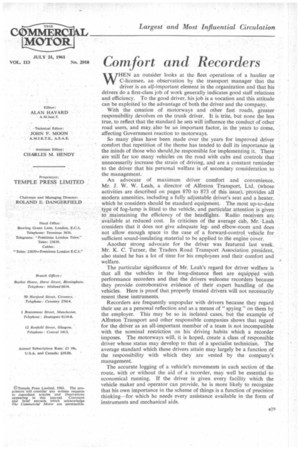Comfort and Recorders
Page 33

If you've noticed an error in this article please click here to report it so we can fix it.
WHEN an outsider looks at the fleet operations of a haulier or C-licensee, an observation by the transport manager that the driver is an all-important element in the organization and that his drivers do a first-class job of work generally indicates good staff relations and efficiency. To the good driver, his job is a vocation and this attitude can be exploited to the advantage of both the driver and the company.
With the creation of motorways and other fast roads, greater responsibility devolves on the trunk driver. It is trite, but none the less true, to reflect that the standard he sets will influence the conduct of other road users, and may. also be an important factor, in the years to come, affecting Government reaction to motorways.
So many Pleas have been made over the years for improved driver comfort that repetition of the theme has tended to dull its importance in the minds of those who should be responsible for implementing it. There are -still far too many vehicles on the road with cabs and controls that unnecessarily increase the strain of driving, and are a constant reminder to the driver that his personal welfare is of secondary consideration to the management.
An advocate of maximum driver comfort and convenience, Mr. J. W. W. Leah, a director of Affreton Transport, Ltd. (whose activities are described on pages 870 to 873 of this issue), pro-vides all modern amenities, including a fully adjustable driver's seat and a heater, which he considers should be standard equipment. The most up-to-date type of fog-lamp is fitted to the vehicle, and particular attention is given to maintaining the efficiency of the headlights. Radio receivers are available at reduced cost. In criticism of the average cab, Mr. Leah considers that it does not give adequate legand elbow-room and does not allow enough space in the case _of a forward-control vehicle for sufficient sound-insulating material to be applied to the engine cover.
Another strong advocate for the driver was featured last week. Mr_ K. C. Turner, the Traders Road Transport Association president, also stated he has a lot of time for his employees and their comfort and welfare.
The particular significance of Mr. Leah's regard for driver welfare is that all the vehicles in the long-distance fleet are equipped with performance recorders and that the drivers welcome recorders because they provide corroborative evidence of their expert handling of the vehicles. Here is proof that properly treated drivers will not necessarily resent these instruments.
Recorders are frequently unpopular with drivers because they regard their use as a personal reflection and as a means of" spying" on them by the employer. This may be so in isolated cases, but the example of Affreton Transport and other responsible companies shows that regard for the driver as an all-important member of a team is not incompatible with the nominal restriction on his driving habits which a recorder imposes. The motorways will, it is hoped, create a class of responsible driver whose status may develop to that of a specialist technician. The average standard which these drivers attain may largely be a function of the responsibility with which they are vested by the company's management.
The accurate logging of a vehicle's movements in each section of the route, with or without the aid of a recorder, may well be essential to economical running. If the driver is given every facility which the vehicle maker and operator can provide, he is more likely to recognize that his own importance in the scheme of things is a function of precision thinking—for which he needs every assistance available in the form of instruments and mechanical aids.
























































































































